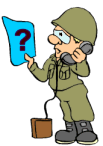For example:
Question: Where is Susan?
Answer : In the kitchen.
Said in a normal voice this is a statement. But said like this
 it is a question, because we are not certain that Susan is there.
it is a question, because we are not certain that Susan is there.

Questions?
What are questions? Most of the things we say are statements. Statements give information to the people we are talking to. Questions are different, because they don't give information, they ask for it. When we ask a question, the person we are asking needs to know firstly, that we are asking a question, and secondly what kind of information is required. We tell people that we are asking a question by changing the grammar and punctuation of our sentence, and when we are speaking, we change our inflection as well.
In English, inflection is changing the ending of a word or the way that we say the word. For questions, we say the end of the sentence in a slightly different tone, raising the pitch of our voices so that the end of the sentence sounds higher. If the sentence is only one word, and we say this in a higher pitch then this is also a question.
For example:
Hey, Pete!
Yes?
Here 'Yes?' means 'What do you want?'
We can also use this kind of inflection to show that we are not sure about our answer.
For example:
Question: Where is Susan?
Answer : In the kitchen.
Said in a normal voice this is a statement. But said like this  it is a question, because we are not certain that Susan is there.
it is a question, because we are not certain that Susan is there.
This inflection is indicated in written punctuation by a question mark, which is why you sometimes see it in sentences that do not look like normal questions – for example when someone answers a phone by saying 'Hello?'
Grammatically, we show that we are forming a question by using inversion. Inversion is when we change the word order of a sentence to show that it is not a normal statement.
The most basic inversion is of subject with auxiliary. If you read the grammar section of lesson two of this course (present simple) you will know that all verbs have an auxiliary, even if the auxiliary 'do' is sometimes left out.
For example:
They (do) like football.
To make a question, you invert the auxiliary (do) with the subject (they) and get this:
Do they like football?
If the sentence contains a modal, we invert that.
For example:
You would like to play football.
Becomes 'Would you like to play football?
If the sentence has a modal and an auxiliary, we invert the modal only
For example:
Fred might have done that.
('Fred' is the subject, 'might' is the modal 'have' is the auxiliary 'done' is the main part of the verb, 'that 'is the object)
We make the question by inverting the modal to get:
Might Fred have done that?
We use the verb 'to be' as we would an auxiliary.
For example:
That is your house.
becomes Is that your house?